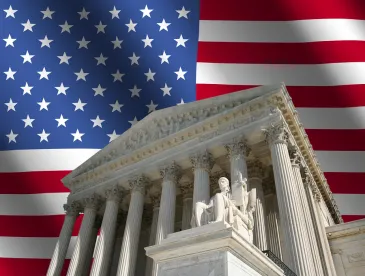On June 15, 2020, the Supreme Court of the United States held that Title VII of the Civil Rights Act of 1964’s prohibition of sex discrimination encompasses discrimination against gay and transgender individuals. Justice Neil Gorsuch authored the 6-3 majority opinion and was joined by Chief Justice John Roberts, Justice Ruth Bader Ginsburg, Justice Stephen Breyer, Justice Sonia Sotomayor, and Justice Elena Kagan.
The majority opinion held that “[s]ex plays a necessary and undisguisable rule, exactly what Title VII forbids,” in adverse actions taken against an individual because the individual is gay or transgender and that “it is impossible to discriminate against a person for being homosexual or transgender without discriminating against that individual based on sex.” In doing so, the Court resolved a circuit split regarding employment discrimination against the LGBTQ community and laid to rest a difficult issue that remained following a series of pro-LGBTQ Supreme Court decisions relating to marriage. (Specifically, in June 2013, the Court struck the definition of marriage as a “legal union between one man and one woman as husband and wife” from the Defense of Marriage Act of 1996 in United States v. Windsor. Two years later, in Obergefell v. Hodges, the Court, in a sharply divided 5-4 decision, held that prohibitions on same-sex marriages violated the equal protection clause of the US Constitution.)
Before the Court were three cases demonstrating the circuit split and the treatment of gay and transgender individuals under Title VII. In Bostock v. Clayton County, Georgia, the U.S. Court of Appeals for the Eleventh Circuit held that it was bound by a prior case finding that “discharge for homosexuality is not protected by Title VII.” The U.S. Court of Appeals for the Second Circuit, sitting en banc in Zarda v. Altitude Express, held that sexual orientation discrimination constitutes a form of discrimination “because of . . . sex” in violation of Title VII. Likewise, the U.S. Court of Appeals for the Sixth Circuit in R.G. & G.R. Harris Funeral Homes, Inc. v. EEOC, held that “discrimination on the basis of transgender and transitioning status violates Title VII.”
The common thread through each case was that shortly after the respective employers learned of their employees’ sexual orientation (Gerald Bostock and Donald Zarda as gay men) or transgender status (Aimee Stephens as a transgender woman), they terminated these long-term employees’ employment. In each case, the employers admitted that they made the termination decision based on the sexual orientation or transgender status of the employees, but argued that those decisions were not prohibited by Title VII. The Court disagreed.
Justice Gorsuch, quoting 42 U.S.C. §2000e-2(a)(1), used a textualist analysis of Title VII’s plain language that it is:
unlawful . . . for an employer to fail or refuse to hire or to discharge any individual, or otherwise to discriminate against any individual with respect to his compensation, terms, conditions, or privileges of employment, because of such individual’s race, color, religion, sex, or national origin.
The Court analyzed the definition of sex and, although arguments existed between the parties during oral argument, they agreed—“sex” meant the biological distinctions between male and female. Even on that basis, the Court determined that in each of the cases presented, the employers made the termination decision at least in part because of the employee’s sex. Therefore, using the “ordinary public meaning of the statute’s language at the time of the law’s adoption, a straightforward rule emerges: An employer violates Title VII when it intentionally fires an individual employee based in part on sex.”
The majority opinion dispensed with the argument that discrimination based on sexual orientation and gender identity is permitted by Title VII because such discrimination would be discrimination against a distinct group of individuals who are not protected by Title VII regardless of their sex. The Court, instead, relied on the plain language found in Title VII’s prohibition on discrimination against an individual because of the individual’s sex. The Court specifically states, “[i]f the employer intentionally relies in part on an individual employee’s sex when deciding to discharge the employee—put differently, if changing the employee’s sex would have yielded a different choice by the employer—a statutory violation has occurred.” The Court stated further that Title VII’s message is “simple and momentous: An individual’s homosexuality or transgender status is not relevant to employment decisions. That’s because it is impossible to discriminate against a person for being homosexual or transgender without discriminating against that individual based on sex.” The Court concluded that the plain meaning of the language in the statute compels this result and should be the end of the analysis.
Nonetheless, the Court then analyzed three prior Supreme Court opinions to provide additional support for its holding in what is clearly the majority’s effort to address the lengthy and strenuously argued dissenting opinions. In a 1971 case, an employer would hire men with young children but not women with young children. The Court rejected the argument that the discrimination was based on motherhood and not on the individual’s sex. In Los Angeles Dept. of Water and Power v. Manhart, 435 U.S. 702 (1978), the employer required women to contribute more to the pension fund because women tended to live longer. The Manhart Court rejected the argument that the employer’s “life expectancy” adjustment was permissible because it was based not on the employee’s sex but rather her life expectancy. Finally, in Oncale v. Sundowner Offshore Services, Inc., 523 U.S. 75 (1998), the Court reasoned that regardless of what “Congress was concerned with when it enacted Title VII” the law prohibited sexual harassment even if the parties were of the same sex.
From these prior cases, the Court took three lessons that it applied to Bostock: (1) what the employer calls a discriminatory practice, how others label it, and other potential motivators are irrelevant; (2) “sex need not be the sole or primary cause of the employer’s adverse action”; and (3) liability is not avoided by showing that the employer comparably treats males and females as groups. Although acknowledging that “homosexuality and transgender status are distinct concepts from sex,” the majority opinion dispensed with each of the employer’s arguments, holding strong to the principle that it is impossible to discriminate against an individual for being homosexual or transgender without discriminating against an individual based on sex.
The Court also found unpersuasive the originalism argument. That argument is premised upon the idea that in 1964, when Congress enacted Title VII, it neither intended nor would it have expected Title VII to apply to discrimination against homosexual or transgender persons. The Court first explained that the statutory text was clear and unambiguous, which, according to the Court, should end the inquiry. But it went on to consider the ordinary meaning of the statutory terms in 1964. Neither the dissenting justices nor the employers, however, argued that the statutory text meant something different in 1964, but rather that Congress would not have meant for or expected the statutory language to have this result. The majority then analyzed multiple decisions since the law’s passage where the Court found unlawful acts that Congress may not have expected in 1964. For example, the Oncale case held that Title VII prohibits same-sex sexual harassment. Ultimately, the majority fell back on its role to apply the law as it was written and not as it could have been written or what the unexpected applications of the law could have been when Congress passed Title VII.
Lastly, the Court addressed the employers’ cited consequences of holding that Title VII’s prohibition of discrimination based on sex applies to gay and transgender individuals—namely single-sex bathrooms and locker rooms, the unsustainability of dress codes, and the issues presented by this application of Title VII on an individual’s religious convictions. For each of these issues, the Court leaves open the possibility of addressing those issues when they are presented to the Court, but refused to rule on those concerns because they were not before the Court here.
Ultimately, the Court applied the self-described “simple and momentous rule”: “An individual’s homosexuality or transgender status is not relevant to employment decisions. That’s because it is impossible to discriminate against a person for being homosexual or transgender without discriminating against that individual based on sex.” With this opinion, Title VII now unambiguously prohibits discrimination against individuals because they are gay or transgender.
Justice Clarence Thomas joined Justice Samuel Alito’s dissenting opinion and Justice Brett Kavanaugh wrote a separate dissenting opinion. Ogletree Deakins will be publishing additional analysis of the dissenting opinions and other issues and potential effects of the Bostock decision.





 />i
/>i

